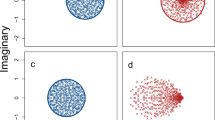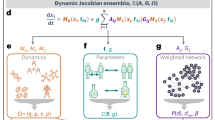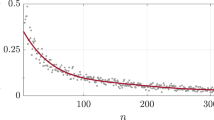Abstract
Gardner and Ashby1 have suggested that large complex systems which are assembled (connected) at random may be expected to be stable up to a certain critical level of connectance, and then, as this increases, to suddenly become unstable. Their conclusions were based on the trend of computer studies of systems with 4, 7 and 10 variables.
This is a preview of subscription content, access via your institution
Access options
Subscribe to this journal
Receive 51 print issues and online access
$199.00 per year
only $3.90 per issue
Buy this article
- Purchase on Springer Link
- Instant access to full article PDF
Prices may be subject to local taxes which are calculated during checkout
Similar content being viewed by others
References
Gardner, M. R., and Ashby, W. R., Nature, 228, 784 (1970).
Margalef, R., Perspectives in Ecological Theory (University of Chicago, 1968).
May, R. M., Math. Biosci., 12, 59 (1971).
Wigner, E. P., Proc. Fourth Canad. Math. Cong., Toronto, 174 (1959).
Mehta, M. L., Random Matrices, 12 (Academic Press, New York, 1967).
Ginibre, J., J. Math. Phys., 6, 44 (1965).
Margalef, R., Perspectives in Ecological Theory, 7 (University of Chicago, 1968).
Author information
Authors and Affiliations
Rights and permissions
About this article
Cite this article
MAY, R. Will a Large Complex System be Stable?. Nature 238, 413–414 (1972). https://doi.org/10.1038/238413a0
Received:
Issue Date:
DOI: https://doi.org/10.1038/238413a0
This article is cited by
-
Computational dissection of genetic variation modulating the response of multiple photosynthetic phenotypes to the light environment
BMC Genomics (2024)
-
Quantitative description of six fish species’ gut contents and prey abundances in the Baltic Sea (1968–1978)
Scientific Data (2024)
-
Horizontal gene transfer is predicted to overcome the diversity limit of competing microbial species
Nature Communications (2024)
-
Robustness and resilience of complex networks
Nature Reviews Physics (2024)
-
Community ecological response to polycyclic aromatic hydrocarbons in Baiyangdian Lake based on an ecological model
Ecotoxicology (2024)
Comments
By submitting a comment you agree to abide by our Terms and Community Guidelines. If you find something abusive or that does not comply with our terms or guidelines please flag it as inappropriate.



